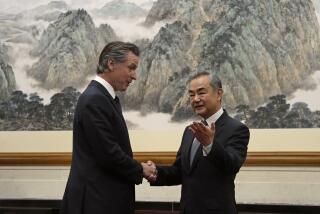An Old Soldier With A Lot on His Mind : Al Haig worries about the China situation.
- Share via
There are some men and women in public life whose judgment seems more grounded after they depart the limelight than when they were still doused in it. Perhaps it was this sentiment that promoted my call last week in San Diego on Alexander M. Haig Jr., President Reagan’s first secretary of state. For, in all candor, this former Army officer and public servant is probably most remembered for his unnerving initial public reaction to the 1981 assassination attempt on his boss, the president: “I am in charge,” was what he blurted out to the TV camera and so to the entire universe. Coming from a career military man, that did not pack quite the calming effect on America that this patriot undoubtedly intended.
Haig resigned in 1982 but stays active today as an international business consultant. Last week at the Republican National Convention, he was unceremoniously billeted at a hotel far enough from the downtown action--such as it was--that the retired, oft-decorated general must have considered the need for airlift capability at least once. But if few of those running the convention wanted to hear what this Vietnam War hero, supreme allied commander in Europe and veteran diplomat had to say, I did.
Most of all, the general is deeply concerned about America’s relationship with China, where he believes the Clinton people have been stumbling badly. A year ago, he insists, we were far closer to war with the Chinese over Taiwan than people realize. He tells the story of a little-publicized meeting in the Oval Office last summer, when he and Henry Kissinger, another former secretary of state, and others, just back from China, where they had gotten an earful, met with the president and aides to make just that point. Says Haig today: “I don’t think his own people had adequately suggested to him that we were really headed on a collision course that neither side wanted. Neither side!”
Haig believes that the great destroyers of a potentially more mature relationship were the vicious Chinese overreaction to the Tiananmen Square uprising in 1989 and the kneejerk U.S. overreaction to their overreaction. Insists the man who, though somewhat infamous for making mincemeat of entire phrases, is rarely one to mince words: “The United States has been too slow in normalizing.”
But haven’t the Chinese done a heck of a lot themselves to engender distrust? Why, just look at the much-documented military buildup of recent years. This recipient of the Purple Heart and many other military recognitions said he is unfazed: “Deng Xiaoping’s 1979 reforms dramatically reduced the size of the military. What the Chinese military is facing today is a huge wall of obsolescence. They had hoped that the wall could be breached primarily with the cooperation of the United States. That got off track at Tiananmen Square.” Haig became pensive, almost sad, but then the old lion started roaring once again: “That doesn’t mean the Chinese are guiltless! They’re difficult, prickly people. But that also makes them very reliable people. When they give you their word, they keep it!”
Like the departing Dwight David Eisenhower, who in his famous 1961 address warned the American people of the dangers of an unbridled “military-industrial complex,” Haig says that not everyone on our side of the fence is rooting for peaceful relations. “Here’s another thing to remember about the American attitude toward China. When the Soviet Union collapsed, a lot of people--some of them in the armed services--started to worry: If you don’t have an enemy, you’ve got a problem. You don’t get the money!”
Haig reminds us that while the United States has never been invaded or occupied by a foreign army, China has, more than once. “My own friends in the Pentagon really don’t see the Chinese military buildup as a problem. It’s very important for us to be talking to the Chinese military so that they know we’re not threatening them, not trying to contain them like some jackass legislators say. Hey, until recently, the Chinese military has been the strongest proponent of a good relationship with us.”
Haig believes that any American president’s job is to become personally engaged with China: “Well, his nose has been pushed into it now. Clinton came in with the stated objective that he was going to forget foreign policy and tend to the long untended problems of American society. Well, he learned that this is not acceptable. Just as Ronald Reagan learned it.”
Abruptly, the old general rose to offer a goodbye. At this point, I’m not sure whether I’m imagining “The Battle Hymn of the Republic” in the background or some echo of that wonderful line about military men in their autumns: “Old soldiers never die, they just fade away.”
But this soldier wasn’t fading out quite yet: “You can’t succeed at home if you fail abroad any more than you can succeed abroad if you fail at home. Bush learned the latter, Clinton has learned the former.”
I left the hotel room reminded of the Asian emphasis on respecting the wisdom of our elders. I think they may be onto something with that.
More to Read
Sign up for Essential California
The most important California stories and recommendations in your inbox every morning.
You may occasionally receive promotional content from the Los Angeles Times.










